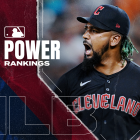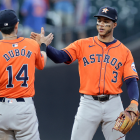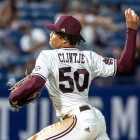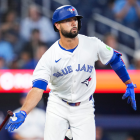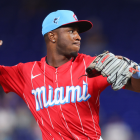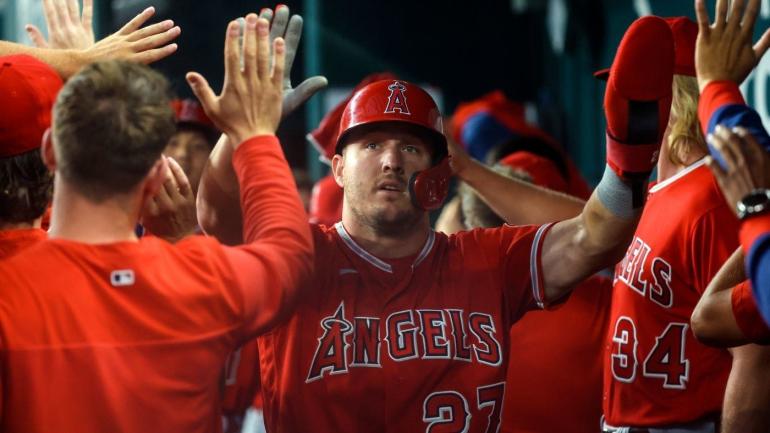
Current three-game skid notwithstanding, the 2022 season thus far has unfolded quite swimmingly for the Los Angeles Angels. At this writing, they're a mere one game behind the Houston Astros and on pace for 99 wins, which would be tied for the second-most in franchise history. As well, the success has been earned at a fundamental level – the Angels' current run differential of plus-48 is bested by only the Yankees among AL squads.
So what's behind the early successes of a club that has endured six straight losing seasons and hasn't made the playoffs since 2014 (and hasn't won a playoff game since 2009)? Not surprisingly, much of it flows from stalwart franchise legend and future Hall of Famer Mike Trout. Here are four reasons why the Angels are off to such a great start.
1. Trout is in vintage form and has been healthy so far
Right now, Trout is slashing .320/.432/.689 with 22 extra-base hits in 35 games. Those are the kind of digits that, if sustained, could land him the AL MVP award for the fourth time. As well, the underlying batted-ball metrics don't suggest anything like a slowing bat or diminished capacity to drive the ball hard – you'll recall that Trout is now in his thirties. Specifically, Trout at present boasts some of the highest average exit velocities and hard-hit rates of his career.
The question with Trout, at least in recent years, is health. He hasn't enjoyed a mostly healthy full season since 2018, and he hasn't topped 150 games played in a season since 2016 (he was largely healthy in 2020, but that COVID-abbreviated campaign spanned just 60 regular-season games). Last year, a serious calf injury limited Trout to just 36 games, and in 2019 a sequence of lower-half injuries cost him time. In 2018 it was a wrist injury, and in 2017 it was a thumb injury. Thus far, the 2022 season has been a pleasing exception, and the Angels' entreaty to all available gods is that Trout remains healthy. There's every reason to believe he'll carry on as the best hitter in baseball as long as he can stay on the field.
Speaking of Trout and his surpassing value to the team, the Angels have infamously frittered away much of his legendary prime by not surrounding him with an adequate supporting cast, but the 2022 campaign has been a departure from that, at least thus far. Speaking of which …
2. Shohei Ohtani is finding his level
The two-way phenom and reigning AL MVP got off to a slow start in 2022. After the first week-plus of the season, Ohtani was lugging around a sub-.500 OPS at the plate, and on the mound a poor early outing against Texas mangled his ERA for some time. Since those low points, however, Ohtani has largely looked the part of hitting and pitching star he proved himself to be last season. To wit, Ohtani with the bat has lifted his offensive numbers into respectable territory, and as a starting moundmans he's now pitched to a 2.82 ERA with 53 strikeouts and nine walks in 38 1/3 innings. Ohtani in his most recent start also showed some of the best fastball velocity of his career, which helps ease any worries about a recent dip in velo.
3. Taylor Ward has been thunderous
Believe it or not, Ward, the 28-year-old right fielder for the Halos, has out-produced even Trout on a rate basis this season. At present, he's batting .375/.488/721 with nine home runs in 29 games. While Ward is coming off a productive 2021, his current level of production seems out of nowhere. However, as our R.J. Anderson recently wrote, there are some changes underpinning the big leap forward:
". . . Ward is showing a more disciplined approach, swinging and chasing less often than before. He's also pulling the ball more frequently, with 45 percent of his batted balls heading to left field, as opposed to just 36 percent last season. Normally, you'd expect that shift to be accompanied by better power numbers; that's not the case here. Ward's raw exit velocity numbers aren't overly impressive, as he ranks in the 46th percentile for balls hit at least 95 mph. He atones for that by ranking in the 90th percentile for balls launched between 10 and 30 degrees. That combination rivals the likes of Bryan Reynolds, George Springer, Nolan Arenado, and Freddie Freeman. That's good company."
No, Ward isn't going to continue hitting at this level across a full-season sample, but he's legitimately leveled up. For instance, right now he ranks in the 90th percentile of MLB in expected batting average and the 97th percentile in expected slugging percentage. While regression is almost certainly in his future, the quality of contact is such that he'll remain a plus producer with the bat.
4. The rotation has been exceptional
In contrast to so much of the Angels' recent history, the rotation this season has helped the cause in a big way. Right now, the Angels rank fourth in all of MLB with a starters' ERA of 3.22. That's a stirring reversal of fortunes for a team that over the last three seasons has ranked 22nd, 29th, and 29th, respectively, in rotation ERA.
While there's no doubting the value that the Halos' rotation has provided thus far, there are concerns moving forward. To wit, as a group they've been a bit fortunate to have such a wee ERA. Angels starters rank just 22nd in strikeout-to-walk ratio, and their current batting average on balls in play of .246 will be very difficult to sustain. As such, the rotation may be primed for regression in the weeks to come.
More questions abound. Will Shohei Ohtani's double duty lead to stretch-drive fatigue on the mound (more on him below)? Can Noah Syndergaard defy history and stay healthy? Will the projected big jump in innings for Reid Detmers and Patrick Sandoval exact a toll in the second half? Because of those uncertainties, it seems highly likely that GM Perry Minasian will be busy looking for a rotation known quantity leading up to the trade deadline.
For now, though, those Angels starters have done their jobs and then some.










